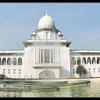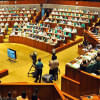'Govt argument to empower JS arbitrary'
The argument for empowering the parliament to remove Supreme Court judges for restoration of 1972 constitution appears as "cheap, populistic, whimsical, arbitrary and sentimental," observed the SC in the 16th constitutional amendment case verdict.
The 16th amendment made in September 2014 had abolished the chief justice led Supreme Judicial Council and restored parliament's power to remove the SC judges on grounds of misconduct or incapacity. The amendment was challenged with the High Court.
In May last year, the HC declared the amendment unconstitutional and void as it found the changes went against the principles of the separation of powers and the independence of the judiciary.
In July last year, the Appellate Division of the SC rejected the appeal and upheld the HC verdict.
During the hearing of the appeal filed by the government against the HC verdict that scrapped the 16th amendment, the attorney general and his colleague had repeatedly made the argument of “1972 constitution” in favour of keeping the 16th amendment as it was.
Prior and after the 16th amendment that had restored the parliament's power to impeach SC judges on grounds of misconduct or incapacity some ministers and ruling party MPs had portrayed it as an effort to return to the original constitution of 1972.
"It appears that going back to the 1972 Constitution is a simple play on the psyche of the public, including the politicians in Parliament. It is 'playing to the gallery' to gain popularity by targeting the 'liberation war sentiment' of the people," observed the apex court in its full verdict released on Tuesday.
The apex court also termed the argument as "cheap, populistic and sentimental argument" and found no logic behind it.
In the verdict, the apex court judges listed some provisions in the constitution which were inserted by the Martial Law Proclamations and by other constitutional amendments, but they were not erased from the constitution by the 15th or the 16th amendments made in 2011 and 2014 by the Awami League government.
Those provisions include status of state religion, the phrase “bismillah-ar-rahman-ar-rahim”- (in the name of Allah, the beneficent, the merciful) above the preamble of the constitution, appointment of SC judges to judicial or quasi-judicial bodies after their retirement, giving the president power to control lower judiciary.
In the original constitution, the SC has been given the authority to have full control over the lower judiciary.
"It appears that the desire of reverting to the 1972 Constitution has been carried out somewhat whimsically and arbitrarily."
It was argued before the court that the provision for removal of SC judges by parliament has been included in the 1972 constitution and this should not be questioned.
The apex court did not agree with this argument.
"Using the words used in the 1972 Constitution will not make any such amendment sacrosanct and unquestionable. The Constitution of 1972 has sacrosanctity only because it was 'plenary law' created for the first time by the will of the people and there is nothing against which to compare or test its validity," said the court.
"This is absolutely a novel argument of the learned Attorney General and the learned Additional Attorney General just to give a seal of legitimacy to Sixteenth Amendment by capitalising easy sentiment."
The attorney general had also argued that the Supreme Judicial Council was cancelled by the 16th amendment as it was the intention of the parliament to rid the constitution of any vestiges of Martial Law Proclamation.
The apex court made the following observations in response to the arguments made by the attorney general.
It said the original 1972 constitution describes the Government of Bangladesh as "secular", but in 1977 an executive proclamation deleted the word "secular" and inserted a phrase stating that a fundamental State principle is "absolute trust and faith in the Almighty Allah".
"The phrase “bismillah-ar-rahman-ar-rahim”- (in the name of Allah, the beneficent, the merciful) was inserted before the Preamble of the Constitution. Undoubtedly these were political moves in order to strengthen relationships with the Muslim countries, including wealthy Arab oil-producing countries," it adds.
But no attempt has been made to erase these amendments from the constitution. On the contrary, after lengthy discussion, there was a conscious decision to retain these provisions, it adds.
The court said by the eighth amendment, Islam has been given the status of state religion. But in order to cope with the religious sentiment, it was retained though secularism was restored by the fifteenth amendment in 2011.
"Thereby, the principle of secularism was totally compromised and thus buried the spirit of original constitution and liberation war, as was espoused in the 1972 constitution," said the apex court.
It said article 99 of the 1972 constitution provided that a SC judge after retirement or removal could not practice as a lawyer in any court or before any authority nor could be appointed in any post of the country.
The court said martial law proclamations amended this article and allowed judges to be appointed in a judicial or quasi-judicial capacity and permitted a judge of the HC to practice in the Appellate Division after retirement or termination of service, said the SC verdict.
"These amendments were validated by the Fifth Amendment. This amendment was declared unconstitutional, but the Fifteenth Amendment reintroduced article 99 as amended by the Martial Law Proclamations," reads the verdict.
It is interesting, the court said, to note that in the original 1972 constitution there was provision for the President to be sworn in by the chief justice. The fourth amendment provided that the President would be sworn in by the Speaker.
"Thereafter the Martial Law Proclamations reverted back to the position whereby the President would be sworn in by the Chief Justice. The Fifteenth amendment reverted to the position under the Fourth Amendment, and not the 1972 Constitution, thus the President is to be sworn in by the Speaker. That is the position as it stands to date," said the SC verdict.
The court said: "If it was the intention of Parliament to revert to the 1972 Constitution, then the provision should allow the Chief Justice to swear in the President. Hence, it appears that the desire of reverting to the 1972 Constitution has been carried out somewhat whimsically and arbitrarily."
The Constitution of Bangladesh became effective on 16th December 1972, one year after liberation.
In the preamble of the 16th constitutional amendment bill placed in parliament in 2014, the law minister cited some reasons to defend the change.
One of his arguments was that the policy to ensure accountability of higher court judges to the parliament exists in most of the democratic countries in the world.
In the verdict, the apex court however, said: "It is known to the whole world that we achieved independence at the cost of 3(three) million people."
"So, whatever amendment has to be made in our Constitution must be made according to our need keeping in view our socio economic and political condition and public opinion as the foundation of necessity,” hoped the SC. It added that the rule of law which is the fabric of our constitution must not be impaired in any condition.
It further stated: "By referring to the practice/system prevalent in the other countries in the bill of Sixteenth Amendment “we, the people of Bangladesh”, have been undermined, disgraced, degraded, belittled and disrespected."

 For all latest news, follow The Daily Star's Google News channel.
For all latest news, follow The Daily Star's Google News channel. 








Comments